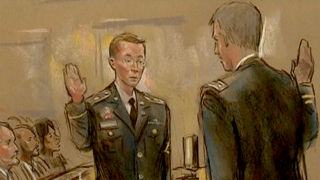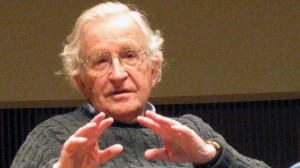
The end of democracy?
NEW YORK CITY – Increasingly, doubts arise as to whether democracy exists in the United States, with eminent voices saying that such a concept is null and void. Noam Chomsky has been saying it for a long time. Gore Vidal had concluded that U.S. politics is “a one-party system, with two right wings.”

Some have said that the growing economic inequality and the concentration of wealth effectively nullify democracy. Others warn that this is already a plutocracy, with elements of a dictatorial or totalitarian state.
Chris Hedges, war correspondent for The New York Times and Pulitzer Prize winner, and more recently an independent commentator/analyst, concludes that, with the trial and sentencing of Bradley Manning, the pretense of democracy has ended in this country.
“The swift and brutal verdict” imposed on Manning “means we have become a nation run by gangsters,” wrote Hedges in his column in Truthdig last week. “It signals the inversion of our moral and legal order, the death of an independent media, and the open and flagrant misuse of the law to prevent any oversight or investigation of official abuses of power, including war crimes.
“The passivity of most of the nation’s citizens — the most spied upon, monitored and controlled population in human history — to the judicial lynching of Manning means they will be next. There are no institutional mechanisms left to halt the shredding of our most fundamental civil liberties […] or to prevent pre-emptive war, the assassination of U.S. citizens by the government and the complete obliteration of privacy,” Hedges wrote.
He stressed that Manning’s sentencing is “one of the most important watersheds in U.S. history. It marks the day when the state formally declared that all who name and expose its crimes will become political prisoners or be forced, like Edward Snowden and perhaps Glenn Greenwald, to spend the rest of their lives in exile.

“It marks the day when the country dropped all pretense of democracy […] It marks the removal of the mask of democracy, already a fiction, and its replacement with the ugly, naked visage of corporate totalitarianism. […] And those who do not accept unlimited state power, always the road to tyranny, will be ruthlessly persecuted. On Wednesday we became vassals.”
For a long time now, Chomsky has been saying that, in practice, this system can no longer be considered a democracy. He says that you only have to observe that the political apex almost always works against the interests of the big majorities and that it manages this by maintaining the disguise of a democracy through a subordinated press and the public relations industry.
In a speech last week, Chomsky said that some of the most prestigious pollsters have reached the conclusion that “roughly 70 percent of the population – the lower 70 percent on the wealth/income scale – have no influence on [national] policy whatsoever. They’re effectively disenfranchised [from democratic participation]. As you move up the wealth/income ladder, you get a little bit more influence on policy. When you get to the top, which is maybe a tenth of one percent, people essentially get what they want, i.e., they determine the policy. So the proper term for that is not democracy; it’s plutocracy.”
Moreover, and referring to the leakers who reveal official secrets, Chomsky reminds us that power has to keep itself away from public view and cites one of the country’s most important politologists, Samuel Huntington of Harvard University, who pointed out the scientific principle that “power remains strong when it remains in the dark. Exposed to sunlight, it begins to evaporate.” Manning and Snowden are jailed or persecuted “for their failure to comprehend this scientific principle.”
But it’s not just some angry journalists and public intellectuals of the stature of Chomsky who are warning that U.S. democracy is null. Former President Jimmy Carter, speaking at a closed-door forum last month, broached the topic of espionage and the violation of human rights it implies.
He concluded, according to [the German magazine] Der Spiegel, that “America does not at the moment have a functioning democracy.” In an interview weeks earlier, Carter had stated publicly that, although Snowden broke the law by leaking secret information, “I think that the invasion of human rights and privacy in the United States has reached an extreme stage […] I believe that this invasion of privacy has been excessive.”
To the influential Afro-American commentator Tavis Smiley, writing in The Washington Post, “poverty is threatening our democracy; it is now a matter of national security. As [Martin Luther] King said, war is still the enemy of the poor. […] As King lived under constant surveillance, our government seems now to be spying on all of us.”
Juan Cole, the outstanding public intellectual and history professor at the University of Michigan, offered a simple commentary on “how to create a dictatorship” in his influential blog, Informed Comment, making a list of everything that’s required, including
• classify all government crimes and violations of the Constitution as secret;
• spy on the public in violation of the Constitution;
• criminalize the revelation of government crimes and spying as Espionage
• further criminalize whistleblowing as Terrorism.
The political apex never tires of repeating that everything it does in the field of national security and its economic and social policies is in the name of “the defense of democracy and freedom” and the American Dream here and abroad.
But, can it “defend democracy” in secret and acting as if the people and the defenders of civil liberties and dissidents were the enemy?
(From the Mexican newspaper La Jornada)

